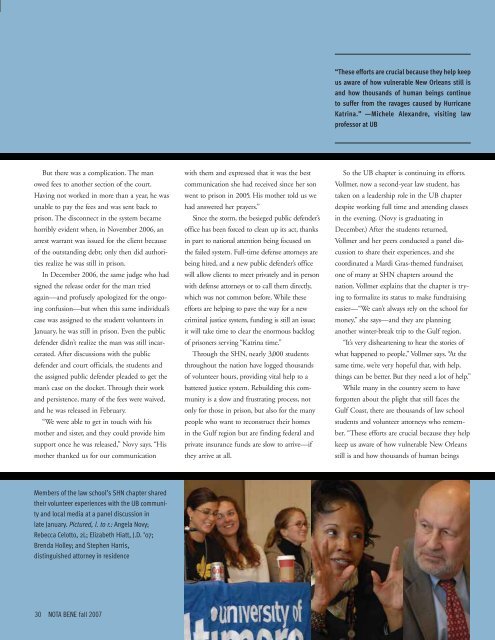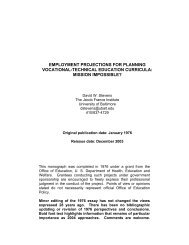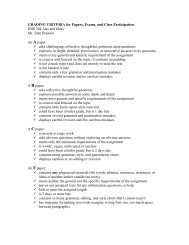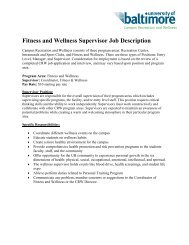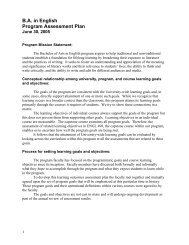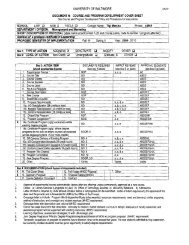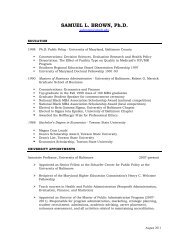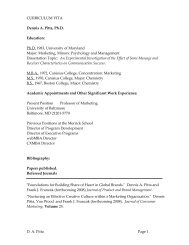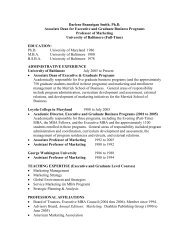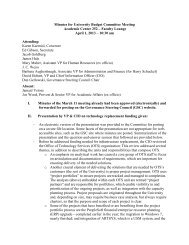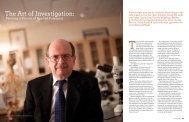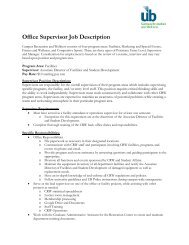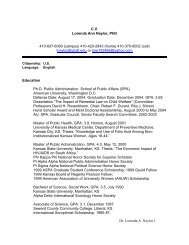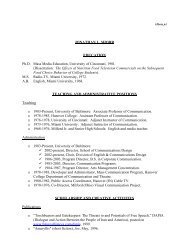NOTA BENE - University of Baltimore
NOTA BENE - University of Baltimore
NOTA BENE - University of Baltimore
- No tags were found...
Create successful ePaper yourself
Turn your PDF publications into a flip-book with our unique Google optimized e-Paper software.
“These efforts are crucial because they help keepus aware <strong>of</strong> how vulnerable New Orleans still isand how thousands <strong>of</strong> human beings continueto suffer from the ravages caused by HurricaneKatrina.” —Michele Alexandre, visiting lawpr<strong>of</strong>essor at UBBut there was a complication. The manowed fees to another section <strong>of</strong> the court.Having not worked in more than a year, he wasunable to pay the fees and was sent back toprison. The disconnect in the system becamehorribly evident when, in November 2006, anarrest warrant was issued for the client because<strong>of</strong> the outstanding debt; only then did authoritiesrealize he was still in prison.In December 2006, the same judge who hadsigned the release order for the man triedagain—and pr<strong>of</strong>usely apologized for the ongoingconfusion—but when this same individual’scase was assigned to the student volunteers inJanuary, he was still in prison. Even the publicdefender didn’t realize the man was still incarcerated.After discussions with the publicdefender and court <strong>of</strong>ficials, the students andthe assigned public defender pleaded to get theman’s case on the docket. Through their workand persistence, many <strong>of</strong> the fees were waived,and he was released in February.“We were able to get in touch with hismother and sister, and they could provide himsupport once he was released,” Novy says. “Hismother thanked us for our communicationwith them and expressed that it was the bestcommunication she had received since her sonwent to prison in 2005. His mother told us wehad answered her prayers.”Since the storm, the besieged public defender’s<strong>of</strong>fice has been forced to clean up its act, thanksin part to national attention being focused onthe failed system. Full-time defense attorneys arebeing hired, and a new public defender’s <strong>of</strong>ficewill allow clients to meet privately and in personwith defense attorneys or to call them directly,which was not common before. While theseefforts are helping to pave the way for a newcriminal justice system, funding is still an issue;it will take time to clear the enormous backlog<strong>of</strong> prisoners serving “Katrina time.”Through the SHN, nearly 3,000 studentsthroughout the nation have logged thousands<strong>of</strong> volunteer hours, providing vital help to abattered justice system. Rebuilding this communityis a slow and frustrating process, notonly for those in prison, but also for the manypeople who want to reconstruct their homesin the Gulf region but are finding federal andprivate insurance funds are slow to arrive—ifthey arrive at all.So the UB chapter is continuing its efforts.Vollmer, now a second-year law student, hastaken on a leadership role in the UB chapterdespite working full time and attending classesin the evening. (Novy is graduating inDecember.) After the students returned,Vollmer and her peers conducted a panel discussionto share their experiences, and shecoordinated a Mardi Gras-themed fundraiser,one <strong>of</strong> many at SHN chapters around thenation. Vollmer explains that the chapter is tryingto formalize its status to make fundraisingeasier—“We can’t always rely on the school formoney,” she says—and they are planninganother winter-break trip to the Gulf region.“It’s very disheartening to hear the stories <strong>of</strong>what happened to people,” Vollmer says. “At thesame time, we’re very hopeful that, with help,things can be better. But they need a lot <strong>of</strong> help.”While many in the country seem to haveforgotten about the plight that still faces theGulf Coast, there are thousands <strong>of</strong> law schoolstudents and volunteer attorneys who remember.“These efforts are crucial because they helpkeep us aware <strong>of</strong> how vulnerable New Orleansstill is and how thousands <strong>of</strong> human beingsMembers <strong>of</strong> the law school’s SHN chapter sharedtheir volunteer experiences with the UB communityand local media at a panel discussion inlate January. Pictured, l. to r.: Angela Novy;Rebecca Celotto, 2L; Elizabeth Hiatt, J.D. ’07;Brenda Holley; and Stephen Harris,distinguished attorney in residence30 <strong>NOTA</strong> <strong>BENE</strong> fall 2007


